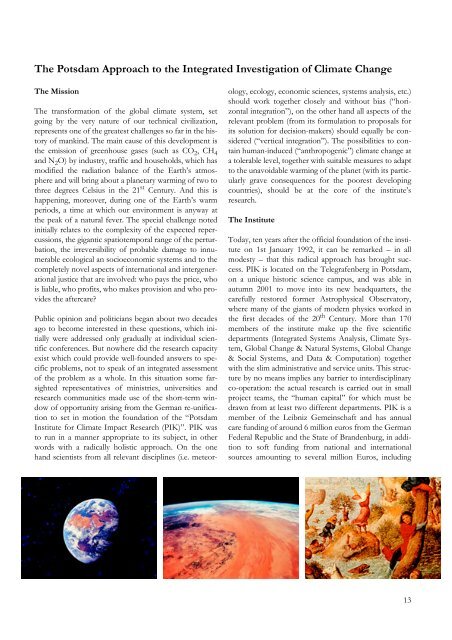PIK Biennial Report 2000-2001 - Potsdam Institute for Climate ...
PIK Biennial Report 2000-2001 - Potsdam Institute for Climate ...
PIK Biennial Report 2000-2001 - Potsdam Institute for Climate ...
Create successful ePaper yourself
Turn your PDF publications into a flip-book with our unique Google optimized e-Paper software.
The <strong>Potsdam</strong> Approach to the Integrated Investigation of <strong>Climate</strong> Change<br />
The Mission<br />
The trans<strong>for</strong>mation of the global climate system, set<br />
going by the very nature of our technical civilization,<br />
represents one of the greatest challenges so far in the history<br />
of mankind. The main cause of this development is<br />
the emission of greenhouse gases (such as CO 2 , CH 4<br />
and N 2 O) by industry, traffic and households, which has<br />
modified the radiation balance of the Earth’s atmosphere<br />
and will bring about a planetary warming of two to<br />
three degrees Celsius in the 21 st Century. And this is<br />
happening, moreover, during one of the Earth’s warm<br />
periods, a time at which our environment is anyway at<br />
the peak of a natural fever. The special challenge noted<br />
initially relates to the complexity of the expected repercussions,<br />
the gigantic spatiotemporal range of the perturbation,<br />
the irreversibility of probable damage to innumerable<br />
ecological an socioeconomic systems and to the<br />
completely novel aspects of international and intergenerational<br />
justice that are involved: who pays the price, who<br />
is liable, who profits, who makes provision and who provides<br />
the aftercare?<br />
Public opinion and politicians began about two decades<br />
ago to become interested in these questions, which initially<br />
were addressed only gradually at individual scientific<br />
conferences. But nowhere did the research capacity<br />
exist which could provide well-founded answers to specific<br />
problems, not to speak of an integrated assessment<br />
of the problem as a whole. In this situation some farsighted<br />
representatives of ministries, universities and<br />
research communities made use of the short-term window<br />
of opportunity arising from the German re-unification<br />
to set in motion the foundation of the “<strong>Potsdam</strong><br />
<strong>Institute</strong> <strong>for</strong> <strong>Climate</strong> Impact Research (<strong>PIK</strong>)”. <strong>PIK</strong> was<br />
to run in a manner appropriate to its subject, in other<br />
words with a radically holistic approach. On the one<br />
hand scientists from all relevant disciplines (i.e. meteor-<br />
ology, ecology, economic sciences, systems analysis, etc.)<br />
should work together closely and without bias (“horizontal<br />
integration”), on the other hand all aspects of the<br />
relevant problem (from its <strong>for</strong>mulation to proposals <strong>for</strong><br />
its solution <strong>for</strong> decision-makers) should equally be considered<br />
(“vertical integration”). The possibilities to contain<br />
human-induced (“anthropogenic”) climate change at<br />
a tolerable level, together with suitable measures to adapt<br />
to the unavoidable warming of the planet (with its particularly<br />
grave consequences <strong>for</strong> the poorest developing<br />
countries), should be at the core of the institute’s<br />
research.<br />
The <strong>Institute</strong><br />
Today, ten years after the official foundation of the institute<br />
on 1st January 1992, it can be remarked – in all<br />
modesty – that this radical approach has brought success.<br />
<strong>PIK</strong> is located on the Telegrafenberg in <strong>Potsdam</strong>,<br />
on a unique historic science campus, and was able in<br />
autumn <strong>2001</strong> to move into its new headquarters, the<br />
carefully restored <strong>for</strong>mer Astrophysical Observatory,<br />
where many of the giants of modern physics worked in<br />
the first decades of the 20 th Century. More than 170<br />
members of the institute make up the five scientific<br />
departments (Integrated Systems Analysis, <strong>Climate</strong> System,<br />
Global Change & Natural Systems, Global Change<br />
& Social Systems, and Data & Computation) together<br />
with the slim administrative and service units. This structure<br />
by no means implies any barrier to interdisciplinary<br />
co-operation: the actual research is carried out in small<br />
project teams, the “human capital” <strong>for</strong> which must be<br />
drawn from at least two different departments. <strong>PIK</strong> is a<br />
member of the Leibniz Gemeinschaft and has annual<br />
care funding of around 6 million euros from the German<br />
Federal Republic and the State of Brandenburg, in addition<br />
to soft funding from national and international<br />
sources amounting to several million Euros, including<br />
13

















